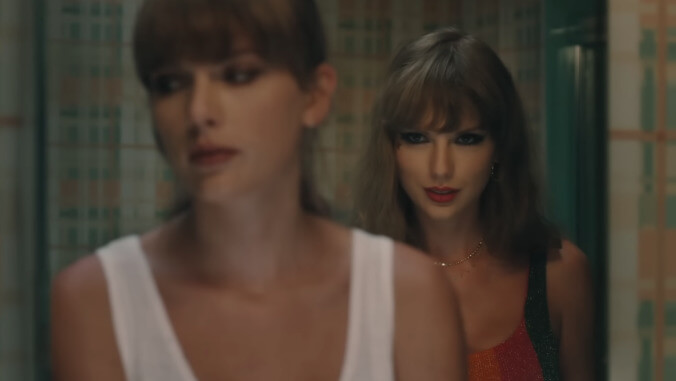How Taylor Swift’s “Anti-Hero” music video cashes in on Midnights’ theme of self-loathing
Taylor Swift invites fans into the darkest part of her psyche in the "Anti-Hero" music video, starring John Early, Mike Birbiglia, and Mary Elizabeth Ellis

A new Taylor Swift album is upon us, and the world has descended into Midnights mayhem. Stepping away from the folky, singer-songwriter vibe of the previous era, the new record feels like a spiritual sibling of 1989. As The A.V. Club’s Saloni Gajjar writes in her B+ review, “Midnights is a giddy, buoyant, somewhat messy return to pop; a heartbreaking confessional gift wrapped with confetti.”
Along with the album comes the first Midnights era music video for “Anti-Hero,” written and directed by the Grammy winner herself. It includes “all the things that make me, me,” as Swift herself would say: glitter, cats, multiple Taylors, an elaborately staged funeral, lots of wine. Fans will of course be tempted, like Swift’s good-for-nothing kids, to look for “a secret encoded message that means something else,” as her son Chad (an always welcome John Early) says. After all, “that’s what mom would always do!” Preston (Mike Birbiglia) agrees.
But one doesn’t have to look too deeply for the message of the “Anti-Hero” video. As on the rest of Midnights, the message is closer to the surface than perhaps any of her previous work. “I just struggle with the idea of not feeling like a person,” Swift admits in an Instagram explainer for the first single. “This song is a real guided tour throughout all the things I tend to hate about myself.”
As such, the “Anti-Hero” visual is a “guided tour” through the album’s main thesis, which is, per Swift, “self-loathing.” On Midnights, Swift acknowledges that fame is a prison, but it’s one she chose. In one scene of the video, her partying pop star alter ego gives a scolding shake of the head as she steps on a scale that reads “FAT.” Later, on the track “You’re On Your Own, Kid,” Swift sings, “I hosted parties and starved my body,” referencing the eating disorder she first disclosed in her documentary Miss Americana. But even though “the jokes weren’t funny, I took the money,” she continues, allowing herself to become a public punchline for personal gain.
Though already much maligned, the “Anti-Hero” lyric “Sometimes, I feel like everybody is a sexy baby,” recalls her fear from the Red Vault Track “Nothing New” that she’ll soon be replaced by pop culture’s next shiny young thing. Whereas Swift herself is “a monster on the hill / Too big to hang out, slowly lurching toward your favorite city,” represented quite literally in the visual by a giant version of herself. “I struggle with the idea that my life has become unmanageably sized,” she says in that same Instagram video.
On “Anti-Hero,” there’s something tragic about being too big to fail (“Pierced through the heart, but never killed”). But Midnights asserts that rising that high is exactly what she asked for, that she made willing sacrifices in the name of “chasing that fame” (per “Midnight Rain”). This has all been by design, she confesses on “Mastermind”: “No one wanted to play with me as a little kid / So I’ve been scheming like a criminal ever since / To make them love me and make it seem effortless.”
While she has asked again and again throughout her discography whether any lover would be willing to put up with her “unmanageably sized” life, on “Anti-Hero” it becomes clear that the person she’s really desperate to have stay by her side is us, the audience. “I wake up screaming from dreaming / One day, I’ll watch as you’re leaving / And life will lose all its meaning,” she sings. If the fans disappear, then all those sacrifices will have been for naught.
Still, Swift acknowledges that she’s not always the easiest to root for, comparing herself unfavorably to a congressman whose “covert narcissism I disguise as altruism.” (In the video, the “mirrorball” so desperate to be loved covers up her wounds with a campaign button that reads “Vote for me for everything.”) “It must be exhausting always rooting for the anti-hero,” the pop star sympathizes. That would be her—hi, she’s the problem, in case you forgot.